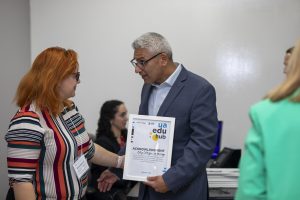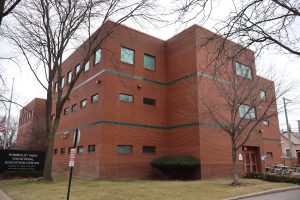Education program for Ukrainian refugees opens physical outpost in Chicago
By Igor Studenkov for Chronicle Media — December 20, 2024
Participating in the ribbon-cutting ceremony at Wilbur Wright College are (from left) Marissa Arrez, director of strategic partnerships, Mayor’s Office of Immigrant, Migrant, & Refugee Rights, Wilbur Wright College President Andres Oroz, Dina Wild, Chicago EduHub Coordinator, NASH Refugee Resettlement Initiative, Stanislav Kutsenko, adviser of Head at the State Institution “Ukrainian Institute of Education Development,” Ukraine Ministry of Education and Science and Mariya Boguslav, executive director of the Association of Innovative and Digital Education, and coordinator of Ukrainian EduHubs Network. (Photo courtesy of City Colleges of Chicago)
Chicago became home to the physical outpost for what was previously an online-only program to help Ukrainian refugees learn English and get jobs in United States.
The Educational Hub for Displaced Ukrainians was launched by Ministry of Education and Science of Ukraine in the wake of Russia’s 2022 full-scale invasion, which sent thousands of its citizens fleeing. Each EduHub helps refugees get jobs and get the certifications they might need in the country where they resettled. Refugees struggling to learn the local language get help with language skills, and all refugees involved get mental health support.
United States EduHub has been up and running since July, but it wasn’t until December that it opened a physical location in Wright College’s Humboldt Park vocational training center, 1645 N. California Ave. The Chicago area has been the second biggest destination for Ukrainian refugees admitted to United States, and the center is the closest City Colleges location to Chicago’s Ukrainian Village neighborhood. The City Colleges describes the hub as part of its long history of educating newly arrived immigrants.
According to the Office of the United Nations High Commissioner for Refugees, as of November 2024, more than 6.78 million Ukrainians fled abroad as refugees. The majority of them ended up in Europe — only around 270,000 have been resettled in the United States.
Association of Innovative and Digital Education developing the particulars of what the EduHubs offer. Mariya Boguslav, the organization’s executive director, told Chronicle Media that the goal is to help the refugees build communities, “to get jobs, to realize themselves in new countries, to realize their skills.”
For Ukrainians struggling with English, that means teaching them English. For Ukrainians who need “soft skills” that can expand their employment prospect, that means training.

Mariya Boguslav, executive director of the Association of Innovative and Digital Education, and Coordinator of Ukrainian EduHubs Network speaks with , City Colleges of Chicago Salgado. (Photo courtesy of City Colleges of Chicago)
In many cases, Boguslav said, the refugees are well-educated, but they find that their degrees or certifications don’t automatically get accepted in United States, so EduHub helps them overcome those procedural and legal hurdles.
“Ukraine is quite an educated nation, and a lot of people have [advanced] education,” she said. “You need to get a job, and sometimes, you can’t find a job in your specialty, because you don’t speak English, or because you don’t have the skills.”
Boguslav said that preparing refugees for what happens after the war ends is an important consideration.
Getting jobs to support themselves and their families is a priority, Boguslav said, and so is giving them an opportunity to develop skills that would come in handy once the war is over.
“It’s important to give them the skills they can use when they come back to Ukraine,” she said. “It will be useful for rebuilding Ukraine after the war is finished.”
Addressing the refugees’ mental health needs, Boguslav said, is also important. Living through the war left lasting trauma, and following the news of what’s happening back home, especially when they have loved ones in Ukraine, is a source of constant stress.
“It’s important to pay attention on the mental health, because if the person has good mental health, they may find motivation to find new skills, to help their family and their children,” Boguslav said.

A Humboldt Park vocational center. (Photo by Igor Studenkov/for Chronicle Media)
One of the advantages of having the vocational school as an offline space, is that Ukrainians can support each other and builb community — an important thing in a country where language barriers and cultural differences can be alienating.
“[It gives them] a possibility to meet offline and discuss some problems, and speak the same language, and also support each other,” Boguslav said.
In the United States, EduHub works with the National Association of Higher Education Systems Refugee Resettlement Initiative, which helps refugees, especially college students and scholars, continue their education in the United States. Colleen Thouez, the organization’s founder and director, said that they helped get the American hub off the ground. They secured funding from Skokie-based Walder Foundation to cover most of the start-up costs, and worked with the City Colleges to set up a physical location.
“Knowledge is power, and process-related information about life in the United States [is something] that any newcomers, including refugees, benefit from learning,” she said, adding that there was something special about Ukrainians being able to “come together [as a community] at a college so close to the Ukrainian Village.”
In a statement to the media, City Colleges of Chicago Chancellor Juan Salgado said that the EduHub was a natural fit for the system.
“Chicago is historically home to one of the highest populations of Ukrainians in the United States and Ukraine is the heritage of a number of our City Colleges students,” he said, “We are honored to host the country’s first-ever Educational Hub for displaced Ukrainians.”
Going forward, Thouez said, they will help raise more money and get the word out. Boguslav said that they were able to take advantage of the community networks that were already there, but they want to make sure the word gets out to as many Ukrainians as possible. They also plan to listen and respond to what the community needs.
Boguslav said that, while the online component of the American EduHub brings its offerings anywhere in the country, they do hope to establish more physical locations in the future.
“We are very happy to be present in the United States, in Chicago, but we hope to also expand our network in other cities in the United States,” she said. “A lot of countries have two to three EduHubs, and we hope that in the bigger cities of the United States, we can add more.”







